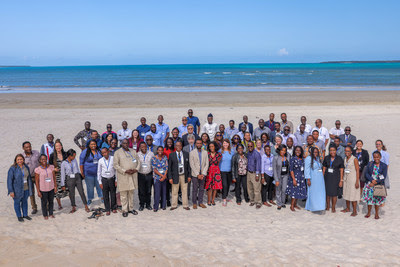International Collaboration to Improve Cancer Care in Sub-Saharan Africa Focuses on Resources for Children’s Cancers
ACC, NCCN, ACS, and CHAI collaborate to launch new NCCN Harmonized Guidelines for Sub-Saharan Africa focused on pediatric cancers; available free at NCCN.org/harmonized .
DAR ES SALAAM, Tanzania and PLYMOUTH MEETING, Pa., Dec. 15, 2022 /PRNewswire/ — The National Comprehensive Cancer Network® (NCCN®)—an alliance of leading cancer centers in the United States—is working on new NCCN Harmonized Guidelines for Sub-Saharan Africa, in collaboration with the African Cancer Coalition (ACC), the American Cancer Society (ACS), and the Clinton Health Access Initiative (CHAI). The organizations are part of Allied Against Cancer, a global multi-sector effort to improve resource-stratified access to life-saving cancer care in Sub-Saharan Africa. These harmonized guidelines build on the successful implementation of evidence-based, expert consensus context-appropriate recommendations for managing nearly all adult cancers across more than a dozen countries throughout the region. The groups recently reunited in Dar es Salaam, Tanzania to launch four additional NCCN Harmonized Guidelines
for Sub-Saharan Africa, in collaboration with the African Cancer Coalition (ACC), the American Cancer Society (ACS), and the Clinton Health Access Initiative (CHAI). The organizations are part of Allied Against Cancer, a global multi-sector effort to improve resource-stratified access to life-saving cancer care in Sub-Saharan Africa. These harmonized guidelines build on the successful implementation of evidence-based, expert consensus context-appropriate recommendations for managing nearly all adult cancers across more than a dozen countries throughout the region. The groups recently reunited in Dar es Salaam, Tanzania to launch four additional NCCN Harmonized Guidelines specifically focused on best practices for treating children with cancer.
specifically focused on best practices for treating children with cancer.

NCCN Harmonized Guidelines use color-coded recommendations for optimal cancer care in high-resource settings alongside pragmatic modifications for effective treatment options in low- and mid-resource settings. The guidelines are established in collaboration with local health ministries, providers, and advocates, and are based on the NCCN Clinical Practice Guidelines in Oncology (NCCN Guidelines®)—a recognized standard for clinical direction and policy in cancer management worldwide. NCCN Harmonized Guidelines
use color-coded recommendations for optimal cancer care in high-resource settings alongside pragmatic modifications for effective treatment options in low- and mid-resource settings. The guidelines are established in collaboration with local health ministries, providers, and advocates, and are based on the NCCN Clinical Practice Guidelines in Oncology (NCCN Guidelines®)—a recognized standard for clinical direction and policy in cancer management worldwide. NCCN Harmonized Guidelines for Sub-Saharan Africa are available for free at NCCN.org/harmonized or via the Virtual Library of NCCN Guidelines®App.
for Sub-Saharan Africa are available for free at NCCN.org/harmonized or via the Virtual Library of NCCN Guidelines®App.
“With approximately 90% of childhood cancers occurring in low- to middle-income countries (LMICs), the need for harmonized treatment guidelines for Sub-Saharan Africa for this unique population is paramount,” said Dr. Edith Matsikidze, Oncologist at Parirenyatwa Hospital in Zimbabwe and Member of the African Cancer Coalition. “The collaborations between African experts working together with experts from NCCN will greatly contribute towards standard treatment practices across the African continent. The NCCN Harmonized Guidelines have come at the right time, as we work towards achieving the Global Initiative for Childhood Cancer (GICC) goal of at least a 60% survival rate for childhood cancer in LMICs. The implementation of affordable, available, high-impact, and evidence-based interventions—as outlined in these guidelines—is a pragmatic solution that I would recommend for immediate adoption.”
The new pediatric guidelines will cover:
- Pediatric B-cell lymphomas (aka non-Hodgkin lymphomas, and including Burkitt lymphoma)
- Pediatric central nervous system (CNS) cancers
- Pediatric Hodgkin lymphoma
- Wilms tumor
These add to 51 existing NCCN Harmonized Guidelines for Sub-Saharan Africa providing best practice cancer treatment recommendations for more than 95% of all adult cancer incidence in the region, including breast, prostate, and cervical cancers. Treatment Guidelines for pediatric acute lymphoblastic leukemia as well as supportive care guidelines (e.g. adult cancer pain, survivorship, smoking cessation) were published previously.
for Sub-Saharan Africa providing best practice cancer treatment recommendations for more than 95% of all adult cancer incidence in the region, including breast, prostate, and cervical cancers. Treatment Guidelines for pediatric acute lymphoblastic leukemia as well as supportive care guidelines (e.g. adult cancer pain, survivorship, smoking cessation) were published previously.
“Children everywhere should receive the best possible treatment based on the latest evidence and all available resources,” said Jamie Flerlage, MD, St. Jude Children’s Research Hospital, Chair of the NCCN Guidelines Panel for Pediatric Hodgkin Lymphoma. “Some children’s cancers, such as Burkitt lymphoma, are more common in Africa than the United States. This initiative allows for a collaborative approach to help pediatric patients, while also learning from expert care providers across the sub-Saharan region.”
Dr. Flerlage was joined in Tanzania by:
- Anita Mahajan, MD, Mayo Clinic Cancer Center, Vice-Chair, NCCN Guidelines Panel for Pediatric Central Nervous System Cancers
- Al B. Benson III, MD, FACP, FACCC, FASCO, Robert H. Lurie Comprehensive Cancer Center of Northwestern University, Chair, NCCN Guidelines Panels for Colon/Rectal/Anal/Small Bowel Cancers and Hepatobiliary Cancers
NCCN Harmonized Guidelines for Sub-Saharan Africa first debuted in November of 2017, during the biennial African Organisation for Research and Training in Cancer (AORTIC) conference in Kigali, Rwanda. They have been officially endorsed in Ethiopia, Malawi, Nigeria, Tanzania, Uganda, and Zambia.
for Sub-Saharan Africa first debuted in November of 2017, during the biennial African Organisation for Research and Training in Cancer (AORTIC) conference in Kigali, Rwanda. They have been officially endorsed in Ethiopia, Malawi, Nigeria, Tanzania, Uganda, and Zambia.
Learn more about NCCN’s collaborative work to define and advance high-quality, high-value, patient-centered cancer care globally at NCCN.org/global.
The National Comprehensive Cancer Network® (NCCN®) is a not-for-profit alliance of leading cancer centers devoted to patient care, research, and education. NCCN is dedicated to improving and facilitating quality, effective, equitable, and accessible cancer care so all patients can live better lives.
Media Contact:
Rachel Darwin
267-622-6624
darwin@nccn.org
Photo – https://mma.prnewswire.com/

